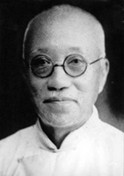Wu Leichuan on:
[Wikipedia]
[Google]
[Amazon]
 Wu Leichuan (; alt. ) (1870–1944) was a leading Chinese
Wu Leichuan (; alt. ) (1870–1944) was a leading Chinese
 Wu Leichuan (; alt. ) (1870–1944) was a leading Chinese
Wu Leichuan (; alt. ) (1870–1944) was a leading Chinese theologian
Theology is the systematic study of the nature of the divine and, more broadly, of religious belief. It is taught as an academic discipline, typically in universities and seminaries. It occupies itself with the unique content of analyzing the ...
in the early 20th century and Chancellor of Yenching University
Yenching University (), was a university in Beijing, China, that was formed out of the merger of four Christian colleges between the years 1915 and 1920. The term "Yenching" comes from an alternative name for old Beijing, derived from its status ...
.
Biography
From his childhood, Wu poured his energy into mastering theConfucian
Confucianism, also known as Ruism or Ru classicism, is a system of thought and behavior originating in ancient China. Variously described as tradition, a philosophy, a Religious Confucianism, religion, a humanistic or rationalistic religion, ...
classics and working his way up through the imperial examinations, obtaining the level of Jìnshì (進士) in 1898 in Beijing after passing the metropolitan and imperial examinations. He converted to Christianity in 1915 and became Yenching University's first Chinese vice-president and chancellor between 1926 and 1934.
Confucianism and Christianity
During theAnti-Christian movement The Anti-Christian Movement (非基督教运动) was an intellectual and political movement in China in the 1920s. The May Fourth Movement for a New Culture attacked religion of all sorts, including Confucianism and Buddhism as well as Christianity ...
of the 1920s, Wu wrote prolifically in an attempt to fuse Christian theology with Confucian concepts. He argued that important Christian values had Confucian
Confucianism, also known as Ruism or Ru classicism, is a system of thought and behavior originating in ancient China. Variously described as tradition, a philosophy, a Religious Confucianism, religion, a humanistic or rationalistic religion, ...
counterparts: love as ren (仁), prayer with self-cultivation (修养), and Christmas as a time to celebrate the birthdays of Christ and Confucius
Confucius ( ; zh, s=, p=Kǒng Fūzǐ, "Master Kǒng"; or commonly zh, s=, p=Kǒngzǐ, labels=no; – ) was a Chinese philosopher and politician of the Spring and Autumn period who is traditionally considered the paragon of Chinese sages. C ...
. Wu also drew parallels between the Christian Bible and the Confucian Zhongyong, from the Genesis 2:7 creation account with Zhongyong chapter 1 to the Messiah of Isaiah 11:1-10 with the Zhongyong savior in chapter 31.
See also
* Protestant missions in China 1807-1953 *T. C. Chao
Tzu-ch'en Chao (; 1888–1979), also known as T. C. Chao, was one of the leading Protestant theological thinkers in China in the early twentieth century.
Life
Chao was born on February 14, 1888, in Xinshi, Deqing County, Zhejiang, China. ...
References
Further reading
* * {{DEFAULTSORT:Wu, Leichuan 1870 births 1944 deaths Presidents of Yenching University Converts to Protestantism Chinese Protestants Chinese religious leaders Chinese Christian theologians